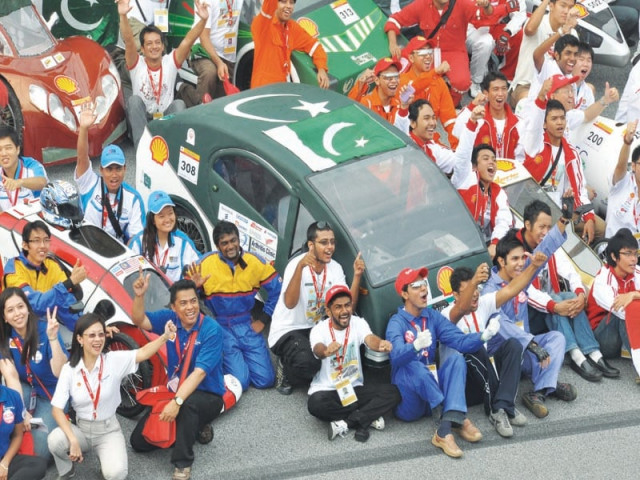Pakistan well-represented in global competition for most fuel-efficient car
NUST students claim their vehicle will run 200km with one litre of fuel.

A total of 127 teams will participate in the Asian Shell Eco Marathon this year. PHOTO: FILE
The Shell Eco Marathon, which is what the competition is known as, takes place in the Americas, Asia and Europe every year, for which student teams from engineering universities all around the world attempt to build automobiles that can travel the farthest while consuming the least amount of fuel. A total of 127 teams will participate in the Asian Shell Eco Marathon this year, which will be held in Kuala Lumpur, Malaysia. Thirteen teams from eight different engineering universities will be representing Pakistan in the prestigious event.

One of the competing teams from Pakistan this year is from the Pakistan Navy Engineering College (PNEC), which is a constituent college of the National University of Science and Technology (NUST).
“We expect our urban concept car to travel 200 kilometres (km) consuming just one litre of gasoline [petrol]. Its estimated speed will be around 30 kilometres per hour,” Masroor Mehdi, a final year mechanical engineering student at NUST-PNEC, explained to The Express Tribune. Mehdi is part of a 14-member team that has built two separate cars for the upcoming competition.
There are two categories a team can compete in: urban concept cars and prototype cars. An urban concept car should be a four-wheeler and must have almost all features that are generally considered necessary for ordinary cars, such as comfort, safety, wipers, luggage space etc.
Prototype cars are ‘futuristic cars’ that, in most cases, are three-wheelers, ultra-lightweight, cut back on friction and are built with honed aerodynamics.
All cars must belong to one of the seven fuel categories: namely, petrol, diesel, bio-fuels, fuel made from natural gas, hydrogen, solar or electricity. Both cars manufactured by NUST-PNEC run on petrol.
According to Babar Ali, another team member, last year’s team from NUST-PNEC had built a car that travelled 66km using a litre of gasoline. However, the Asian winner of last year’s competition had manufactured a car that had a fuel efficiency level of 192km per litre. “That’s why we are fairly optimistic about our chances of winning the competition this time around,” he said.
The urban concept car weighs around 110 kilogrammes (kg). The one manufactured last year weighed 148kg. For comparison, a small, ordinary Pakistani car weighs roughly 1,000kg. “In order to make our cars weigh less and perform better, we’ve used 6061-T6 grade aluminium for their chassis. It gives them the strength of mild steel, but it’s a lot lighter in weight. The lighter weight, better aerodynamics and less friction make our cars more competitive,” said Ali Akram, a team member currently majoring in mechanical engineering.
Pakistan Navy is the key sponsor of the team, as the cars have been manufactured at the Pakistan Navy Dockyard in Karachi. Honda has sponsored the car engines, while the cars’ bearings have been sponsored by SKF, an American company, through its local distribution firm. Lucky Cement, Pepsi and Habib Bank are other sponsors.
“Funding is a major issue. We approached all sponsors ourselves. Sadly, our corporate sector is not willing to support us as much as their counterparts support engineering students in other countries,” Akram said.
According to back-of-the-envelope calculations based on informal student interaction, the Indonesian car that won last year’s competition in Asia was manufactured at a cost of roughly Rs2.5 million. “This year, we have manufactured both cars at a total cost of between Rs400,000 and Rs500,000. Isn’t that an achievement, given the low level of sponsors’ support in our case?” he asked, rhetorically.
“We were 10th among the 117 teams last year. I’m confident that we’ll be in the top three teams this time around,” Akram said.
Published in The Express Tribune, May 15th, 2013.
Like Business on Facebook to stay informed and join in the conversation.



















COMMENTS
Comments are moderated and generally will be posted if they are on-topic and not abusive.
For more information, please see our Comments FAQ